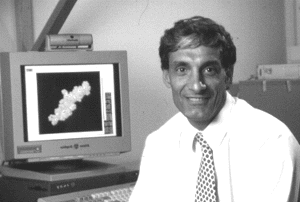
 Getting in the swing
Getting in the swing
Homewood campus is all but deserted on this cold Thursday
night, save for a few well-wrapped souls who are making their way
into Levering. Once inside, familiar faces greet one another and
mingle, while the rest file directly into the Great Hall.
Just before 5 p.m. a rather sizable crowd has
gathered, 80 in all, and the large room fills with talk and the
shuffling of feet resonating upon the wood floor. The majority of
the group are students, eager to get started with the night's
activity. A woman with a headset gets their attention.
"All right, let's get started," says the woman,
who is dressed in narrow white pants and a big pink sweater.
"Girls over here, and boys over there." The group obliges, and,
reminiscent of a high school mixer, the two sexes face each other
from opposite sides of the room. Now it's time to do what they
came here for: dance.
The woman with the headset is Joanne Houlahan,
a full-time faculty member in the School of Engineering's
Computer Science Department, who for the past six years has been
teaching a swing dance class during intersession. Typically the
class has averaged about 40 to 50 students, but this year
Houlahan certainly has her hands full because right now swing (in
case you slept through 1998) is the latest craze.
Full story...
 New science program to break
barriers
New science program to break
barriers
Chemists, biologists, computer scientists and engineers
usually work independently, pursuing their own research projects
with their own tools and methods. But a $2.5 million grant will
allow the university to train some of tomorrow's scientists and
engineers in a new way, by breaking through some of the
boundaries that traditionally divide these scientific
disciplines.
The grant, to be provided over five years by
the Burroughs Wellcome Fund, will help establish the Johns
Hopkins Program in Computational Biology. The program will have a
special emphasis on cutting-edge genomics research, in which
scientists sequence DNA from cells and viruses and then use that
information to solve the far more difficult questions of how
cells assemble the larger molecules and complex structures that
make them work.
Full story...
| [ The Gazette | Search | About the Gazette | Send us Email ] |
The Gazette
 The Johns Hopkins University
The Johns Hopkins University
 Suite 100
Suite 100

3003 North Charles Street
 Baltimore, Maryland 21218
Baltimore, Maryland 21218
 (410) 516-8514
(410) 516-8514  gazette@resource.ca.jhu.edu.
gazette@resource.ca.jhu.edu.
